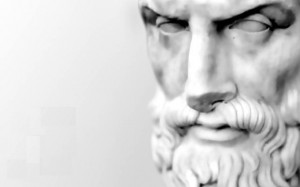Now, farewell. Remember all my words.– Epicurus’ last words
A funny twist happened in the 2012 narrative when the world didn’t end and no significant historical events transpired on the solstice. Many 2012-ers began to speak of the world coming to a start. Although I normally remain cynical, I liked the idea of a fresh perspective, the idea that periodically one can start again, remove the dross of the ages to use Marxist verbiage, or bad faith to use existentialist verbiage. Alan Watts said our history is not our destiny. Without renewal, we’d be slaves to the past.
At around the beginning of 2013, I decided to not only send an Act of Defection to the dioceses where I had been baptized as an infant without my consent, but also to take a vow to formally adopt Epicureanism as my philosophy, as was done in antiquity according to the sources which indicate that Epicurus “instituted a hierarchical system of levels among his followers, and had them swear an oath on his core tenets“.
I did this, in part, because for months I’ve been saying: “Wouldn’t it be great if the ancient schools and the Epicurean Gardens had not been dismantled, but had continued to exist until our day?” Now, I’ve decided that rather than continuing to say this, I will be the change I want to see.
Some of my Epicurean associates question whether Seneca’s account of the oath linked back to Epicurus, or whether it was the invention of later disciples. I don’t know that this matters: if the vow feels authentic, then it’s valid, as far as I’m concerned. The formality of the Act of Defection led me to research the Epicurean oath, and after deliberating on whether or not to formally adopt the philosophy as my own, I wrote a simple discipleship resolution that reflected my level of adherence and am now officially and formally a proud disciple of Epicurus. The following is a generic contemporary version of the vow that I wrote for this:
I, ___ , freely and out of my own authenticity declare myself a disciple of Epicurus and I resolve to follow his teachings and to adopt his doctrine as my own, to further it, update it, and make it relevant in my context. I take refuge in his teachings and I resolve to share them with anyone who expresses a genuine interest in them. I resolve to treat my mind as an Epicurean Garden and to cultivate it. I resolve to apply the four remedies, to seek the three goods and to cultivate a blissful state of ataraxia.
In recent months, I took to delving into the Epicurean doctrine in a full manner, seeking to maximize the benefits and the consolations of philosophy. And so I did not take this oath, until I had thoroughly studied the foundations upon which I was setting my spiritual welfare and, having considered that Epicurean Gardens persisted for seven centuries and obviously fulfilled the social, mental, and other needs of adherents, I decided that this noble philosophy was worthwhile, robust, relevant, and inspiring, that it represented the best and the highest of the secular humanist tradition, and that I needed and desired the light discipline that it provided me with.
Less than two months later, I founded the International Society of Friends of Epicurus with the help and/or solidarity of several independent groups and individuals, including the support of Cassius of the New Epicurean webpage. We now have two meetup groups in New Jersey and Chicago.
Our vision is a full revival of the ancient schools and Gardens, so that philosophy will be seen again as the legitimate alternative to superstition and ignorance. Just as there are temples for many religions in every city and village, there should be Epicurean Gardens and philosophical groups in every city.
We live in very confusing times. The legacy of the dark ages still clouds the minds of many. Discussions of ethics in our national discourse, unfortunately, too often degenerate into supernatural claims that seek to legitimize unwholesome policies based on wrong views: the habitual denial of civil rights to gay people, the predatory excesses of the church, the hesitation to fund legitimate science research that might save lives, and a general spirit of hostility towards science, even in some science classrooms, are some examples of the sad repercussions of the prevalence of false opinion in public policy.
Philosophy, which gives us the only proper context for any ethical debate, is flatly dismissed in our public discourse. Are we not homo sapiens, the wise hominid? Is sapiens not what makes us civilized, and unlike beasts?
We Epicureans are Secular Humanists, by definition, but said label is too broad to really encompass the core of our true values and the essence of our true spirituality. Epicureans offer a fresh ethical discourse rooted in nature and in philosophy. Our tradition contextualizes ethical issues within the realm of tangible human suffering versus tangible human happiness and tranquility. Our tradition even stands at the very root of seminal notions that define the very basics of the worldview of Western civilization, like the idea of the social contract as a tool for non-violent cooperation and for the rule of law.
We’re told about our inherent right to be happy (or to not be happy: we’re certainly free to be miserable) … but Epicurus offered us the methodology for the pursuit of happiness. Choices, choices, choices. At every moment, we choose a path that leads to misery or happiness. I, for one, do not take for granted the legacy of our Hegemon and have made my choice to recollect Epicurus’ words.
*




